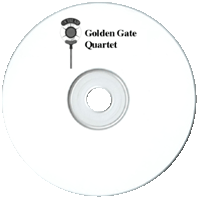

Building on a tradition of vocal harmonies and syncopated rhythms, The Golden Gate Quartet not only popularized Gospel music but helped lay the foundations of Rock and Roll.

82 old time radio show recordings
(total playtime 19 hours, 47 min)
available in the following formats:
1 MP3 CD
or
21 Audio CDs
Text on OTRCAT.com ©2001-2025 OTRCAT INC All Rights Reserved. Reproduction is prohibited.
Jazz is called the American Art Form, but jazz influences are regional. To many, the purest form of jazz is the Dixieland sound which had its genesis with the brass bands formed by inner-city blacks in New Orleans using instruments abandoned by military units on the New Orleans docks at the end of the Spanish American War. The Delta Blues arose as Dixieland came up the river and fused with Scott Joplin's Ragtime, the mournful sounds of downtrodden black field workers, and the slide guitar of Nashville Bluegrass and country gospel. When the Blues reached Chicago, they developed a rye-soaked nightclub quality and Chicago Blues moved East to Harlem where it became polished and even commercial.

Four friends who attended Booker T. Washington High School in Norfolk, Virginia, began singing together in 1935 as The Golden Gate Jubilee Singers (not only did they predate the term Doo-Wop, when they began singing together San Francisco still did not have a bridge named for the group). Willie Johnson took the baritone parts, William Langford and Henry Owens handled tenor and second tenor duties, and the group was anchored by Orlandus Williams' bass.
The 'Gates became popular for local church services and on local Norfolk radio. Their early stylings were closer to Barbershop harmonies, but they soon began employing Jazz elements like syncopated rhythms and scat singing. The landed a regular spot on WIS Columbia, South Carolina, and further expanded their sound by using their voices to imitate instruments; Williams's "boom-boom" bottom replaced the string bass and the tenor's occasion "shang-a-langs" hit the guitar parts. Any of the parts might belt out a "dooo -wop -wop" brass riff.

As it would with many other acts, the War took a toll on the Golden Gate Quartet. Johnson and Wilson were drafted into the Navy. The group reformed after the War but had been supplanted by other "hard gospel" groups like The Dixie Hummingbirds and The Soul Stirrers. A slightly reformed Golden Gate Quartet toured Europe in 1955 to popular success. While performing in Paris in 1959, the group was visited backstage by an American Soldier on furlough from his unit in Germany, Cpl Elvis Presley. Elvis had been a fan of the Golden Gate Quartet since childhood, and when he met up with them in Paris he not only remained for the show, he moved into their hotel to sing with them.
Although the lineup has changed over the years, the Golden Gate Quartet is still active.
Text on OTRCAT.com ©2001-2025 OTRCAT INC All Rights Reserved. Reproduction is prohibited.
You have reached the maximum number of votes for a unregistered user.
Please login or create a new account to continue...
You have reached the maximum number to down votes in this page.



Golden Gate Quartet Disc A001
|
Add Audio CD to Cart - $5.00 |
Golden Gate Quartet Disc A002
|
Add Audio CD to Cart - $5.00 |
Golden Gate Quartet Disc A003
|
Add Audio CD to Cart - $5.00 |
Golden Gate Quartet Disc A004
|
Add Audio CD to Cart - $5.00 |
Golden Gate Quartet Disc A005
|
Add Audio CD to Cart - $5.00 |
Golden Gate Quartet Disc A006
|
Add Audio CD to Cart - $5.00 |
Golden Gate Quartet Disc A007
|
Add Audio CD to Cart - $5.00 |
Golden Gate Quartet Disc A008
|
Add Audio CD to Cart - $5.00 |
Golden Gate Quartet Disc A009
|
Add Audio CD to Cart - $5.00 |
Golden Gate Quartet Disc A010
|
Add Audio CD to Cart - $5.00 |
Golden Gate Quartet Disc A011
|
Add Audio CD to Cart - $5.00 |
Golden Gate Quartet Disc A012
|
Add Audio CD to Cart - $5.00 |
Golden Gate Quartet Disc A013
|
Add Audio CD to Cart - $5.00 |
Golden Gate Quartet Disc A014
|
Add Audio CD to Cart - $5.00 |
Golden Gate Quartet Disc A015
|
Add Audio CD to Cart - $5.00 |
Golden Gate Quartet Disc A016
|
Add Audio CD to Cart - $5.00 |
Golden Gate Quartet Disc A017
|
Add Audio CD to Cart - $5.00 |
Golden Gate Quartet Disc A018
|
Add Audio CD to Cart - $5.00 |
Golden Gate Quartet Disc A019
|
Add Audio CD to Cart - $5.00 |
Golden Gate Quartet Disc A020
|
Add Audio CD to Cart - $5.00 |
Golden Gate Quartet Disc A021
|
Add Audio CD to Cart - $5.00 |
Please wait...
COMMENTS
Matt Verified Purchase
Leave a comment